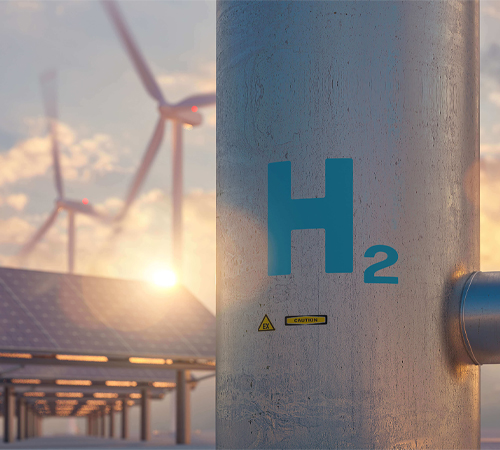
Green hydrogen has emerged as a leading solution to help countries to meet their net zero targets.
Green hydrogen has emerged as a leading solution to help countries to meet their net zero targets. In January 2024, the Royal Society and Royal Academy of Engineering hosted a workshop where the hydrogen community explored the challenges, opportunities, and enablers for a route towards developing a green hydrogen economy in the UK. The resulting report identifies key areas requiring urgent action if the UK is to scale-up green hydrogen at a pace that meets the government’s ambitions both for decarbonisation and for hydrogen as an economic opportunity.
What is green hydrogen?
Hydrogen is a chemical element found in many chemical compounds such as water and methane and has a variety of uses. When burned, hydrogen emits only water, making it a clean alternative to fossil fuel combustion. Green hydrogen is produced by using renewable electricity to split water into hydrogen and oxygen, through electrolysis, a process that emits no greenhouse gases.
Green hydrogen presents a promising path toward achieving net-zero emissions in key sectors. However, rapid development is essential to meet the target of net-zero emissions by 2050. The goal of scaling up green hydrogen in the UK comes with several enablers, opportunities, and challenges that need to be addressed.
What can green hydrogen be used for?
Hydrogen can replace fossil fuels in a variety of applications, including decarbonising industrial processes, powering transportation, and through enabling large-scale electricity storage. It will be best employed where renewable electricity cannot be used, as a lot of energy is lost in the production of green hydrogen.

Chemical synthesis
Hydrogen is already widely used in ammonia production for fertilizers, supported by established infrastructure. It can also serve as a feedstock for alternative “drop-in” fuels like e-fuels and biofuels, crucial for aviation decarbonisation by 2050. However, the hydrogen required for aviation alone matches current global production levels.

Engines
Hydrogen can power internal combustion engines in transport vehicles and non-road mobile machinery. While hydrogen combustion emits no CO2 (carbon dioxide), it does produce NOx, a potent greenhouse gas. Secondary treatments can reduce NOx emissions, but may lower overall efficiency.

Heat
Hydrogen can be burned to produce heat in high-temperature industries like cement or glassware production, where electrification may be challenging.

Fuel cells
Hydrogen fuel cells generate electricity with high efficiency and minimal emissions. They are used in automotive and maritime sectors, but face challenges in cost-effectiveness and require extensive refueling infrastructure for wider adoption.

Energy storage
A decarbonized electricity system with high renewable generation needs many forms of energy storage, including long-duration storage. Geological storage of hydrogen in salt caverns is key for balancing supply during periods of low wind or high demand, ensuring security and replacing fossil gas for seasonal energy needs.
What are the major challenges in transitioning to a green hydrogen economy in the UK?
The report from the Royal Society and Royal Academy of Engineering identifies key challenges and requirements in scaling up green hydrogen production, storage and use:
- Scaling up electrolyser production, supported by robust supply chains.
- Building a strong research and development infrastructure to overcome technical barriers.
- Developing and retaining green hydrogen skills within the workforce, supported by training initiatives and a strong higher education sector.
- Public engagement and consultation.
- Establishing standardized regulations, particularly for testing and safety.
- Creating flexible and future-proof hydrogen transport and storage infrastructure.
- Fostering synergies between production sites and end-users.
- Ensuring coordination between industry, local, and national government.
- Attracting private investment through clear and stable policies to develop markets and fund expansion.
Related resources
Net Zero
Taking a systems approach to achieving net zero by 2050
The role of hydrogen in a net zero energy system
A comprehensive understanding of how low-carbon hydrogen could contribute to achieving net zero.
System impacts of aviation fuel switching
Read the summary of a National Engineering Policy Centre workshop exploring the needs and impacts of a range of aviatio…
